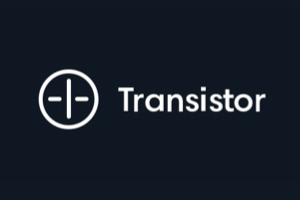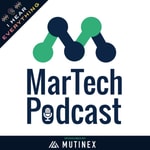Chief Influencer – Détails, épisodes et analyse
Détails du podcast
Informations techniques et générales issues du flux RSS du podcast.

Chief Influencer
Social Driver
Fréquence : 1 épisode/7j. Total Éps: 97

Classements récents
Dernières positions dans les classements Apple Podcasts et Spotify.
Apple Podcasts
🇨🇦 Canada - careers
04/04/2025#69
Spotify
Aucun classement récent disponible
Liens partagés entre épisodes et podcasts
Liens présents dans les descriptions d'épisodes et autres podcasts les utilisant également.
See all- https://www.thetrevorproject.org/
843 partages
- https://hbr.org/
313 partages
- https://www.youtube.com
611 partages
- https://www.youtube.com/@chiefinfluencer
8 partages
- https://www.linkedin.com/in/sjbrinker/
33 partages
- https://www.linkedin.com/in/profgalloway/
13 partages
- https://www.linkedin.com/in/gregkihlstrom/
13 partages
Qualité et score du flux RSS
Évaluation technique de la qualité et de la structure du flux RSS.
See allScore global : 69%
Historique des publications
Répartition mensuelle des publications d'épisodes au fil des années.
U.S. District Judge John Tunheim on Consensus, Communication, and Civic Engagement
Épisode 97
mercredi 2 avril 2025 • Durée 49:26
How do we find consensus in a divided world? In today’s episode, we dive into an inspiring conversation with Judge Tunheim, Senior Judge of the U.S. District Court for the District of Minnesota, who has proven time and again that even in the most polarized situations, common ground can be found. He shares remarkable insights from his tenure, where he successfully led a diverse bench of judges—appointed by different political parties and with varying backgrounds—toward consensus, even when many thought it was impossible.
Beyond the courtroom, Judge Tunheim’s experiences in helping to declassify critical records about a national tragedy, contributing to the formation of a new government, and writing a country’s constitution in six languages highlight his exceptional ability to unite people and navigate complex, high-stakes challenges. This episode is a testament to the power of collaboration, resilience, and the belief that leaders can always find a way forward, no matter how difficult the situation.
Takeaways:
- Teach Young People About the Judiciary: Engage with students to educate them about the judicial system, its importance, and how it works. Use hands-on experiences like the Justice and Democracy Centers to make learning interactive and inspiring.
- Emphasize Civics Education: Advocate for strong civics education programs in schools that teach the foundational elements of government and the importance of civic participation.
- Reach a Consensus: Strive to achieve consensus in decision-making by engaging in detailed discussions, understanding differing perspectives, and seeking common ground that benefits the collective goal.
- Thank People: Regularly thank colleagues and team members, acknowledging their contributions with personal gestures such as handwritten notes to show genuine appreciation.
- Adopt New Technologies: Embrace new technologies, like Zoom, for meetings and court proceedings to enhance efficiency and flexibility, especially in geographically dispersed environments.
- Model the Way: Lead by example, demonstrating the behaviors and practices you wish to see in others. Being a role model can inspire peers and subordinates to follow suit.
- Address Difficult Issues with Soft Skills: Use empathy, communication, and negotiation skills to address and resolve difficult issues. Visit colleagues in their workspace to discuss and solve problems, fostering a respectful and cooperative environment.
Quote of the Show:
- “ Finding common ground is really important. It takes hard work. And it sometimes takes a little sacrifice as well. But I think common ground can be found everywhere.”
Links:
- Website: https://www.mnd.uscourts.gov/
Shout Outs:
Anchored in Optimism: The Fight for Healthcare Rights | Elizabeth G. Taylor
Épisode 96
mercredi 26 mars 2025 • Durée 40:47
Elizabeth G. Taylor, Executive Director at the National Health Law Program, is a passionate advocate who has dedicated her career to fighting for Americans' access to essential health programs like Medicaid. Starting as a public defender, Elizabeth has continued her fight, now representing the nearly 80 million Americans who rely on these programs. Her message is simple but powerful: Medicaid is vital to the health of millions, and cuts to these programs are not an option.
One of the key themes Elizabeth touches on is the power of collaboration. She discusses how she builds strong partnerships, depends on the wisdom of her colleagues, and facilitates meaningful dialogue, both within her organization and among partners. Her approach to influence and coalition-building offers valuable lessons for anyone in advocacy.
This episode is an inspiring reminder of the impact of persistence, partnerships, and clear communication in the fight for justice and health equity.
Takeaways:
- Persevere in Advocacy: Stay resilient and committed when fighting for important causes, as sustained effort is key to making a difference.
- Emphasize Key Issues: Clearly highlight the essential nature of critical programs, ensuring their importance is understood and cuts are not an option.
- Engage Public Input: Leverage public commenting processes to collect personal stories, emphasizing the significance of expert voices and the administrative record.
- Build Strong Partnerships: Cultivate and value key partnerships, recognizing the strength they bring through collaboration and shared wisdom.
- Promote Open Dialogue: Foster transparent communication, both within your organization and among partners, to strengthen collective impact.
- Share Successes: Showcase successful initiatives and real-world examples to demonstrate the effectiveness and impact of your efforts.
- Adopt a Multi-Channel Strategy: Use a variety of approaches to spread your clear, concise message across multiple platforms to reach a wide audience.
Quote of the Show:
- “ We are confident enough of who we are and what we bring to the table that we don't need sharp elbows.”
Links:
- LinkedIn: https://www.linkedin.com/in/elizabeth-g-taylor-250739a1/
- Website: https://healthlaw.org/
Shout Outs:
- My Care Counts: https://whymycarecounts.org/
Patrick J. Kennedy on The Unifying Power of Mental Health - Chief Influencer - Episode # 087
Épisode 87
mercredi 22 janvier 2025 • Durée 53:20
The Honorable Patrick J. Kennedy is a leading advocate for mental health and addiction. As a former Congressman, Patrick was instrumental in passing the Mental Health Parity and Addiction Equity Act of 2008 and has spent years fighting for policy change. After leaving Congress, he founded The Kennedy Forum and co-founded One Mind to advance brain health.
In this episode, Patrick delves into the challenges and stigmas faced by those struggling with mental health and substance use disorders and the impactful decision to share his own story in his book, A Common Struggle: A Personal Journey Through the Past and Future of Mental Illness and Addiction; and the courageous stories of others in his more recent book, Profiles in Mental Health Courage.
Takeaways:
- Be authentic and vulnerable: Share your own story, including struggles and failures, to create genuine connections and inspire others. Authenticity can turn adverse events into strengths, as people appreciate honesty and are more likely to support you when they see you are genuine.
- Build coalitions: Diverse coalitions can drive impactful change. By bringing together different perspectives and points of view, you can create a broader consensus and develop policies or solutions that are more robust and widely accepted.
- Forge bipartisan support in times of polarization: Build bipartisan support by focusing on shared goals and values, using persistence and personal connections to bridge divides in polarized times.
- Connect with your audience through storytelling: Use stories and analogies to make complex issues more relatable and to motivate people to join your cause or mission. Tailored storytelling can rally support and drive collective action.
- Persist through adversity: Use challenges as learning experiences and opportunities to build resilience. Persistence, even in the face of setbacks, is key to achieving long-term goals and making a difference.
- Leverage personal experiences for advocacy: Use your story to highlight broader issues, fostering empathy and inspiring change.
- There is no health without mental health: Advocate for integrating mental health into healthcare, highlighting its connection to physical health and the need for community-based support to reduce costs and improve recovery.
Quote of the Show:
- "We live in a polarized world, but the shared human experience of our mental health can unite us across all divides. These issues transcend the toxic reactivity between opposing sides."
Links:
- LinkedIn: https://www.linkedin.com/in/patrick-j-kennedy-6821ba165/
- Website: https://www.patrickjkennedy.net/
- Books:
- “Profiles in Mental Health Courage”: https://a.co/d/0kFiw9G
- “A Common Struggle: A Personal Journey Through the Past and Future of Mental Illness and Addiction”: https://a.co/d/2ObOEdP
Silvia Taylor on Championing Science and Staying the Course - Chief Influencer - Episode # 086
Épisode 86
mercredi 15 janvier 2025 • Durée 43:14
In this episode of Chief Influencer host Anthony Shop sits down with Silvia Taylor, Executive Vice President, Chief Corporate Affairs and Advocacy Officer at Novavax, a leading biotechnology company.
Silvia shares her wealth of experience in marketing, communications, and branding within the healthcare industry. She takes us through her work in creating innovative marketing strategies, securing financing, and advancing groundbreaking products like inhaled insulin and flu vaccines.
Silvia also dives into Novavax’s swift development of a COVID-19 vaccine, underscoring the importance of clear, consistent messaging and combating misinformation in the healthcare space. She discusses the need for tailored communication for diverse audiences, the role of effective internal communication, and the significant impact of mentorship in her career. Silvia wraps up by looking ahead to the future of healthcare, highlighting the importance of industry preparedness and collaboration for overcoming global health challenges.
Takeaways:
- Stay Consistent with Messaging: The importance of maintaining a consistent message across all communication channels cannot be overstated. A consistent message builds trust among stakeholders—employees, consumers, investors, and the general public. It's vital to ensure that your team is on the same page and speaks with one voice.
- Understand Your Audience: Customizing your message for different audiences is key to effective communication. Know where your audience is coming from, what they need to hear, and what their concerns and fears might be. This enables you to tailor your message in a way that resonates with them.
- Harness the Power of Internal Communication: Your employees are your most important messengers. Equip them with the knowledge and understanding of the company’s mission, vision and values so they can effectively convey them externally. Internal communication is crucial for aligning the team and ensuring consistent external communication.
- Embrace Change and Innovation: Introducing new and disruptive technologies requires clear and compelling communication. Articulate why the change is necessary and how it benefits both the organization and its stakeholders. Use innovative approaches to capture attention and convey your message.
- Leverage Diverse Perspectives: Diversity in thought, background, and experience enriches decision-making and problem-solving processes. Champion diverse voices within your organization to foster a more inclusive environment and generate comprehensive solutions.
- Address Misinformation Proactively: In an age of widespread misinformation, it’s vital to proactively communicate credible, science-backed information. Identify and address common misconceptions directly while staying true to your core message and values.
- Mentorship and Continuous Learning: Invest in mentorship programs to build the next generation of leaders. Mentor others by helping them identify and work on their career development goals. This not only helps individuals grow but also strengthens the organization as a whole by fostering a culture of continuous learning and growth.
Quote of the Show:
- “Consistency in message builds trust, even in times of rapid change. Stay the course, at the end of the day we’re championing science and we’re championing the things people can do to keep themselves and their loved ones well.”
Links:
- LinkedIn: https://www.linkedin.com/in/silviabtaylor/
- Website: https://www.novavax.com/
Jennifer Bell-Ellwanger on Harnessing Data for Success - Chief Influencer - Episode # 085
Épisode 85
mercredi 8 janvier 2025 • Durée 42:52
In this week’s episode of Chief Influencer, we’re featuring Jennifer Bell Elwanger, President and CEO of the Data Quality Campaign. She discusses her career journey from a kindergarten teacher in the Bronx to leading a nonprofit organization dedicated to making data accessible and useful for educational and career decisions.
Jennifer emphasizes the importance of data in making informed choices and highlights her organization's efforts to provide timely and actionable data from early learning through workforce development. She shares insights on her roles in New York City's education system, Baltimore City Public Schools, and the U.S. Department of Education, where she focused on integrating data to support student success. Jennifer also talks about the challenges and triumphs of being a woman in data, the significance of storytelling in data communication, and the influence of mentors in her career.
Takeaways:
- Data for Informed Decision-Making: Ensure data is accessible to all stakeholders for evidence-based decision-making.
- Start with Questions: Define clear objectives and goals to guide purposeful and relevant data collection and analysis.
- Clear Communication: Foster clear and simple communication, making complex data understandable to all audiences.
- Challenge Preconceived Notions: Address biases and preconceived notions to build trust and competency within teams.
- Mentorship and Accessibility: Build relationships through regular one-on-one meetings, fostering trust and support.
- Trust and Collaboration: Create a culture of trust and collaboration, where team members feel secure sharing ideas and feedback.
- Humanize Data: Remember the human element behind the data, creating relatable and actionable narratives for meaningful change.
Quote of the Show:
- “Behind every data point is a person, a student, and a heartbeat.”
Links:
- LinkedIn: https://www.linkedin.com/in/jennifer-bell-ellwanger/
- Website: https://dataqualitycampaign.org/
Shout Outs:
- Mayor Michael Bloomberg: https://www.linkedin.com/in/mikebloomberg/
- Dr. Andres Alonso: https://www.linkedin.com/in/andres-a-alonso-783aa897/
- New York City Department of Education: https://www.schools.nyc.gov/
- Baltimore City Public Schools: https://www.baltimorecityschools.org/
- The U.S. Department of Education: https://www.ed.gov/
- David Coleman: https://www.linkedin.com/in/david-coleman-7854309a/
- President Obama
- Secretary Duncan
- Secretary King
- No Child Left Behind Campaign
Monica Goldson on Communicating Effectively with Every Stakeholder - Chief Influencer - (Re-Air)
Épisode 84
jeudi 2 janvier 2025 • Durée 50:30
This week, we are revisiting a remarkable Chief Influencer—Dr. Monica Goldson, a dedicated educator and visionary leader whose unwavering commitment to improving her community has earned her widespread recognition. Dr. Goldson is the former CEO of Prince George’s County Public Schools in Maryland, one of the largest school districts in the nation.
We are thrilled to congratulate her on her new role as President & CEO of Junior Achievement of Greater Washington, a dynamic nonprofit organization that is transforming the lives of youth in the D.C. Metro area. Through hands-on education in financial literacy, work readiness, and entrepreneurship, Junior Achievement is equipping the next generation with the tools they need to succeed.
Key Takeaways:
- As a leader, you need to identify the stakeholders that you need to reach and the communication channels and formats that each prefers. For instance, Dr. Goldson’s students primarily use Twitter and Instagram, so that’s how she alerts them of timely news or shares relevant messaging. Parents or teachers, on the other hand, rely on other forms of communication. To reach them, Dr. Goldson and her team use a wide range of tools including a weekly newsletter, automated phone messages, and “town hall” style meetings via telephone.
- One example of how Dr. Goldson embraced two-way communication with stakeholders is the town-hall-style meetings she held with parents through the pandemic. By doing this, she could share the latest school-health updates, field questions from parents, and bring on doctors to educate parents on pandemic-related health issues.
- The message is just as important as the medium. Leaders should tailor their message according to what each group of stakeholders needs.
- When you are communicating with your stakeholders, it’s important to remember that you need to listen. Make sure that people feel heard and are able to ask questions freely. This openness is a building block of trust in your relationship with them.
- Consistency is also key to building trust. When you communicate consistently, people know what to expect from you, when to expect it, and through which channel.
- You will not always be the most impactful voice for sharing certain messages with a given group. For example, Dr. Goldson realized when discussing certain topics, such as drug abuse, students are more likely to listen to fellow students. This led to an effective student-made video outlining the dangers of using drugs.
- Don’t run from the media. Media outlets can be powerful allies to have in your corner as you lead your organization. Remember that media outlets do not only focus on negative stories; when you do something great, especially for others, reach out to see if there is interest amongst broadcasters in covering it.
Quote of the Show:
- “Never let a good crisis go to waste.” - Monica Goldson
Links:
- LinkedIn: https://www.linkedin.com/in/monica-goldson-ed-d-99770283/
- PGCPS Fentanyl PSA: https://fb.watch/kQJAroxp_i/
- PGCPS Website: https://www.pgcps.org/
Ways to Tune In:
- Spotify: https://open.spotify.com/show/0DjyDgAnBZ1Pgy4Lyojgs1
- Apple Podcasts: https://podcasts.apple.com/us/podcast/chief-influencer/id1688769403
- Amazon Music: https://music.amazon.com/podcasts/27c24d98-1121-465a-bd8f-d7314a9a4482
- iHeart Radio:
- Podchaser: https://www.podchaser.com/podcasts/chief-influencer-podcast-5328948
- YouTube: https://youtu.be/LyViaRx0JZ8
Leadership Lessons from 2024's Top Chief Influencers - Chief Influencer - Episode # 083
Épisode 83
lundi 23 décembre 2024 • Durée 38:49
In this special episode of Chief Influencer, we reflect on the influential leaders who appeared on the show in 2024. We are featuring insights from Jennifer Sirangelo, Candice Jones, Congressman Andy Kim, Allan Golston, Ambassador Jacques Pitteloud, Eric Pan, Virginia Ali, Terry Szuplat, Charles D. Henderson, and Dr. Arthur C. Evans Jr.
We are revisiting the stories of leaders from both corporate and nonprofit sectors, showcasing their efforts in driving organizational success and creating a lasting societal impact. Key topics include stakeholder management's importance, leadership accountability, and the cultural nuances that shape communication.
The episode highlights the role of influence in personal and professional spheres, with notable guests sharing their experiences working with diverse groups—from board members and global affiliates to policymakers and the public. Emphasizing authenticity and mutual respect, they discuss effective leadership and initiatives focused on social justice, healthcare access, and community well-being, illustrating how these leaders navigate challenges to drive positive change.
Takeaways:
- Engage and Diversify Stakeholders: Understand the importance of different stakeholders, including board members, affiliates, and external NGOs. Tailor your approach based on their unique needs and contributions.
- Leverage Volunteerism and Civic Engagement: Volunteerism and civic engagement are crucial for fostering a sense of community and addressing social issues.
- Empower Authentic Leadership: Influence should come from authenticity rather than a persona.
- Adapt Communication for Cultural Contexts: Effective communication varies significantly across cultures, and it’s important to adapt your style to fit the audience.
- Promote Mutual Influence: Influence isn't one-sided; it's about being open to influence as well.
- Utilize Strategic Storytelling: Quality storytelling can influence public perception and drive policy changes.
- Focus on Socioeconomic and Health Disparities: Addressing health and socioeconomic disparities is essential for equitable progress.
Links:
- Jennifer Sirangelo
- Candice Jones
- Congressman Andy Kim
- Allan Golston
- LinkedIn: https://www.linkedin.com/in/allan-golston/
- Website: https://www.gatesfoundation.org/
- Ambassador Jaques Pitteloud
- Eric Pan
- LinkedIn: https://www.linkedin.com/in/eric-pan-0352772/
- Website: https://www.ici.org/
- Virginia Ali
- Website: https://benschilibowl.com/
- Terry Szuplat
- Charles D. Henderson:
- LinkedIn: https://www.linkedin.com/in/charlesdhenderson/
- Website: https://diabetes.org/
- Dr. Arthur C. Evans Jr.
- LinkedIn: https://www.linkedin.com/in/arthur-c-evans-phd/
- Website: https://www.apa.org/
Fabrice Houdart on Overcoming Self-Doubt to Influence the Boardroom
Épisode 82
mercredi 18 décembre 2024 • Durée 47:51
This week's episode features Fabrice Houdart, the Executive Director of the Association of LGBTQ+ Corporate Directors. He explores his career dedicated to economic empowerment and advocacy for LGBTQ+ equality. Fabrice reflects on his transition from roles at organizations like the World Bank and the United Nations to founding initiatives aimed at increasing LGBTQ+ representation on corporate boards.
He discusses the challenges and successes of organizing underrepresented groups and offers insights into leadership and influence in corporate governance. The conversation also touches on his personal experiences with self-doubt and how he leverages platforms like Substack and LinkedIn to engage and inspire the community.
Takeaways:
- Embrace Diversity for Better Outcomes: Ensure your leadership includes diverse voices (LGBTQ+, racial, ethnic, socioeconomic) as this can lead to better decision-making and outcomes. Representation is not just for the sake of it; diverse perspectives can provide unique solutions and innovations.
- Be Authentic in Your Leadership Style: Leaders should find and embrace their own genuine style of influence rather than emulating a traditionally confrontational or aggressive approach. Authentic leadership fosters trust and loyalty.
- Build a Supportive Board Culture: When creating or leading a board, involve people who bring different strengths and perspectives. Encourage a culture where voices are heard and valued, and work actively to remove barriers that have historically excluded underrepresented groups.
- Leverage Influence Through Strategic Partnerships: Partner with other groups and allies who are focused on similar objectives. Interpersonal relationships between groups can enhance advocacy and impact. Cooperation over competition ensures progress for all underrepresented groups.
- Consistent Communication Is Key: Regular and consistent communication through platforms like LinkedIn or Substack helps to build and maintain influence. Don’t underestimate the importance of staying connected and communicating your mission and values.
- Seek and Value Diverse Opinions: In decision-making processes, involve a variety of voices to ensure broader perspectives and better-informed outcomes. Regularly seek advice and feedback from different stakeholders to improve your strategies and initiatives.
- Acknowledge and Address Self-Doubt: Recognize that self-doubt is common and can be influenced by past experiences. Addressing it openly can be empowering and can help you move forward more confidently. Build a community or support network to help mitigate these feelings and reinforce your achievements.
Quote of the Show:
- Starting to realize that people in leadership positions are actually people like us, and in many ways, they are not superhumans, really helped decrease my own self-doubt. Interacting with people in positions of leadership is what ultimately gave me more confidence in my own ability to lead."
Links:
- LinkedIn: https://www.linkedin.com/in/fabricehoudart/
- Website: https://lgbtqdirectors.org/
Shout Outs:
- World Bank: https://www.worldbank.org/ext/en/home
- United Nations: https://www.un.org/en/
- Koppa - The LGBTI+ Economic Power Lab: https://koppalab.org/
- L’Oréal Global Diversity and Inclusion Advisory Board: https://www.loreal.com/en/news/commitments/global-diversity-and-inclusion-advisory-board/
- The Women’s Forum Editorial Board
How Persistence Fuels Success: Bob Cusack on Surviving and Thriving in Media
Épisode 81
mercredi 11 décembre 2024 • Durée 48:07
This week's episode features Bob Cusack, Editor-in-Chief of The Hill. The discussion explores Bob's extensive career in Washington politics and the changing landscape of journalism. Bob reflects on the media industry's transformation due to the internet and social media, highlighting the need to balance speed with accuracy in news reporting. Personal anecdotes shed light on Bob’s early career persistence and his unique background in acting, which has shaped his journalism skills. The conversation also covers the role of personal connections in advocacy, the growing influence of social media, and the challenges and opportunities of building trust with the audience.
Takeaways:
- Maintain Strong Ethics: Journalism companies must uphold strong ethics, label sponsored content clearly, and strive for balanced, unbiased reporting to ensure credibility and trust.
- Build Personal Connections: Establish personal relationships, especially with policymakers or Congress members, as real-life stories and testimonials can be highly influential.
- Build and Maintain Trust: Ensure transparency, admit mistakes, and maintain consistent ethics and quality to build trust, which can differentiate your organization.
- Persistence Pays Off: Consistent effort and dedication can open doors, whether securing interviews, deals, or influencing key stakeholders.
- Simplify Your Message: When explaining complex topics, simplify the content without oversimplifying, to expand audience reach and ensure resonance with a broad group.
- Create Compelling Content: Ensure your communications are engaging, relevant, and valuable to capture and retain your audience's attention.
Quote of the Show:
- “Persistence is key. You have to be persistent and remember that your reputation is the most valuable thing you have.”
Links:
- LinkedIn: https://www.linkedin.com/in/bob-cusack-5873462b/
- Website: https://thehill.com/
Shout Outs:
- Inside Washington Publishers: https://iwpnews.com/index.html
- National Press Club: https://www.press.org/
- Society of Professional Journalists: https://www.spj.org/
- Screen Actors Guild: https://www.sagaftra.org/
- HBO’s Veep: https://www.hbo.com/veep
- Capitol Hill
- Harvard Kennedy School: https://www.hks.harvard.edu/
- Joe Rogan
- Elon Musk
- Loyola University: https://www.luc.edu/
- Baltimore Orioles: https://www.mlb.com/orioles
- Peter Angelos
- Alexandria Ocasio-Cortez (AOC)
- Nexstar Media Group: https://www.nexstar.tv/networks/
- News Nation: https://www.newsnationnow.com/
- Matt Walsh
- Julia Louis-Dreyfus
The Power of Listening: Dr. Arthur C. Evans Jr. on Influencing Organizations, Transforming Systems, and Shaping Public Policy
Épisode 80
mercredi 4 décembre 2024 • Durée 01:00:36
In this interview, Dr. Arthur C. Evans Jr., CEO of the American Psychological Association (APA), reflects on his career and contributions to the nation’s approach to mental health. He discusses his public policy background and tenure as Commissioner of Philadelphia's Department of Behavioral Health and Intellectual Disability Services.
Dr. Evans stresses the importance of redefining mental health as a universal issue that affects everyone, not just those with diagnosed conditions. He shares strategies for influencing policymakers and the public, advocates for community-based solutions, and highlights innovative approaches like using murals to reduce stigma.
Dr. Evans also explores the role of technology in improving psychological practices and promoting psychologically healthy workplaces for all. The conversation highlights APA's increasing/growing shift to outward-facing initiatives, leveraging psychological science to address societal challenges. Dr. Evans concludes by offering insights on organizational growth, adapting messaging while staying true to core values, and the role of inspiration in leadership.
Takeaways:
- Use Knowledge to Address Societal Issues: Leverage your organization's expertise and data to tackle pressing societal issues. Ensure that your actions align with your field's core mission and values, as this alignment can increase stakeholder engagement.
- Build Necessary Infrastructure: Success stems from having the right infrastructure in place. Organizations should be designed to achieve desired outcomes, which often means setting up mechanisms for rapid research dissemination and effective communication to stakeholders.
- Measure Impact with Clear Metrics: Track the effectiveness of your initiatives by looking at practical measures such as media mentions, partnerships formed, and the degree to which others use your information. This helps in validating the success and outreach of your initiatives.
- Communicate Based on Facts, Not Emotions: Especially in politically charged environments, it’s crucial to present information objectively and grounded in solid data. This approach lends credibility to your work and helps maintain a long-term, bipartisan influence.
- Promote a Healthy Work Environment: Implement policies that focus on employee well-being, such as regular mental health days, and utilize employee feedback, such as surveys. Encouraging employees to genuinely take time off and address their stressors can vastly improve workplace health and productivity.
- Engage and Listen to the Community: Actively participate in community events and listen to both their needs and their ideas for solutions. This approach ensures that your policies and initiatives are rooted in the real, lived experiences of the communities you aim to serve.
- Inspire Your Team: Keep your team motivated by regularly connecting their daily tasks to the larger organizational mission. Signing off communications with encouraging messages, such as 'stay inspired,' helps maintain a motivated and engaged workforce.
Quote of the Show:
- “Inherent in every community is the wisdom to solve its own problems. When you listen to communities, hear what their issues are, and their understanding of the solutions, you get some very innovative solutions.”
Links:
- LinkedIn: https://www.linkedin.com/in/arthur-c-evans-phd/
- Website: https://www.apa.org/
Shout Outs:
- Internal Nectar Program (APA)
- Allows colleagues to give compliments to one another and illustrates how the APA cares for its employees and members.
- American Medical Associaiton: https://www.ama-assn.org/
- National Council for Mental Wellbeing: https://www.thenationalcouncil.org/
- Society of Biological Psychiatry: https://sobp.org/
- Yale University: https://www.yale.edu/
- The City of Philadelphia: https://www.phila.gov/
- Terry Szuplat: https://www.linkedin.com/in/terry-szuplat-456914137/
- The White House
- Former President Barack Obama









